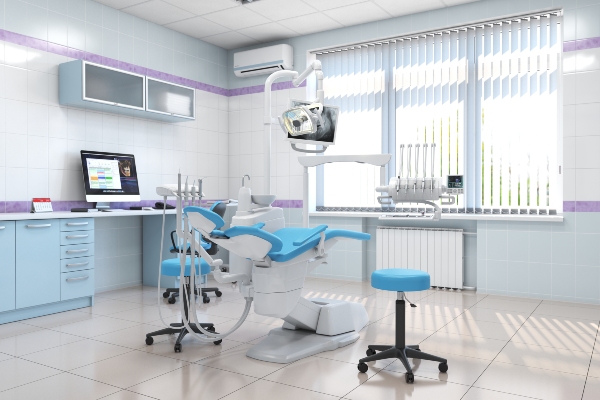Can an Emergency Dentist Repair Broken Dentures?

When dentures break, patients may have difficulty with daily activities, such as speaking and eating. Do not wait until your next regular dental appointment to address this issue. If you cannot be seen in a timely manner, an emergency dentist can help patients restore their dentures as quickly as possible.
Reasons dentures break
Dentures are usually durable but do sometimes break. There are several common causes of broken dentures.
Wear and tear
Normal use subjects your dentures to stress. Over time, the stress caused by chewing and the temperature changes from consuming hot and cold foods can cause damage to dentures.
Accidents
Impacts caused by dropping the dentures when they are not in your mouth, playing sports, or a trip-and-fall accident can damage dentures. If you play contact sports, you may want to remove your dentures during the game.
Bone loss
Bone loss can cause the jaw to change shape, which may result in your dentures no longer fitting correctly. Improperly fitted dentures may shift and crack due to unintended pressure points.
Eating certain foods
Foods that have high sugar or acid content can break down the materials in your dentures. Additionally, chewing on hard foods, such as nuts, seeds, and ice, or non-food objects, such as pens or fingernails, can cause damage.
Repairing broken dentures
A set of broken dentures may not seem like a job for an emergency dentist because it is not a painful condition. However, replacing or repairing broken dentures quickly is important for several reasons.
Importance of repairing broken dentures
The inability to chew properly can severely restrict the types of foods you can eat and cause nutritional deficiencies. Additionally, improperly chewed food can cause digestion issues and be a choking hazard. You may also have difficulty speaking without your dentures.
Do-it-yourself denture repair
Avoid attempting to repair dentures with household glues. Some glues can cause stomach upset when ingested. The glue may also damage the plastic part of your denture. Some pharmacies sell denture repair kits. However, attempting to repair your dentures yourself could further damage them and make it more difficult for an emergency dentist to perform repairs. An improperly repaired denture can be uncomfortable to wear and cause injury to the tongue and gums.
Emergency dental repair
Before you visit the dentist, gather any broken pieces of your denture, including wiring and pieces of broken or chipped teeth. Avoid wearing damaged dentures. Store them in a soaking solution or storage case until your dental appointment.
Your emergency dentist will examine your denture and determine whether it should be repaired in-office, sent to a laboratory, or replaced. If your dentures no longer fit properly, the dentist may reline them. If the dentures are worn out, a replacement may be recommended.
Improving denture longevity
While some accidents are beyond your control, there are steps you can take to prevent unnecessary damage and prolong the life of these dental appliances. First, see your dentist on a regular basis and schedule an appointment right away if you notice any changes in comfort or fit. Routine adjustments can help ensure more even pressure across the appliance, resulting in fewer "stress fractures" to the material. In addition, these adjustments will help keep your mouth comfortable.
If dentures dry out and become brittle, they are much more prone to damage. Be sure to follow your dentist's instructions for cleaning and storage. Soak them appropriately to help protect the materials and keep them just a little more pliable. This will also help remove the bacteria and food particles that cause odors and stains.
When handling your dentures, take a minute to set up a safe space with extra cushioning in case something falls from your mouth or hands. Place a fluffy towel across your bathroom counter and sink. If you do not already have a plush bath mat nearby, lay a towel on the floor as well. This way, if the dentures fall, they will not land on a hard surface and have a much lower chance of becoming cracked or broken.
Conclusion
A set of broken dentures can impair a person's ability to eat and speak. It is not advisable to wear broken dentures or attempt to repair them yourself, as this can lead to more damage and serious complications. Contacting an emergency dentist as soon as possible can help you get back to your normal daily activities quickly.
Request an appointment here: https://pearlcity.diamondheaddentalcare.com or call Diamond Head Dental Care at (808) 214-9287 for an appointment in our Pearl City office.
Check out what others are saying about our dental services on Yelp: Emergency Dentist in Pearl City, HI.
Recent Posts
A damaged tooth can cause significant pain and lead to more severe dental issues when not treated as soon as possible. An emergency dentist can preserve oral health when unexpected dental injuries occur. Whether the damage results from an accident, a fall, or biting onto something hard, immediate professional guidance and treatment can prevent further…
Seeking an emergency dentist immediately after a dental injury can help prevent further complications and ensure proper treatment. Whether a tooth is chipped, cracked, or knocked out, taking the right precautions is essential for preserving oral health. However, some actions can worsen the damage or delay healing. To protect the teeth and avoid additional harm,…
Tooth pain can feel overwhelming while waiting to see an emergency dentist. That is why it is crucial to have a plan for controlling pain until one can get to a dentist. Though home remedies are not a substitute for professional care, they can help ease the pain until treatment is available.Tooth pain can result…
An emergency dentist is essential for treating dental injuries, including a knocked-out tooth. Whether resulting from a sports injury, accident, or fall, a lost tooth requires immediate attention to improve the chances of successful re-implantation. Timely care from a skilled emergency dental professional further increases the likelihood of preserving the tooth and reducing the risk…


